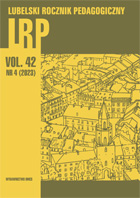UCZENIE SIĘ WE WSPÓŁPRACY ZE STUDENTAMI –
UŻYTECZNOŚĆ AFORDANCJI INTERPERSONALNYCH
W POLU OCENIANIA
COLLABORATIVE LEARNING WITH STUDENTS – THE RELEVANCE OF
INTERPERSONAL AFFORDANCES IN THE FIELD OF ASSESSMENT
Author(s): Zuzanna ZbrógSubject(s): Preschool education, Sociology of Education, Pedagogy
Published by: Wydawnictwo Naukowe Uniwersytetu Marii Curie-Sklodowskiej
Keywords: communities of practice; pre-service teacher education; constructive feedback; autoethnography; affordance; knowledge sharing;
Summary/Abstract: Introduction: In the introduction I explain the meaning of the main concepts and theoreti-cal categories: a community of practice, the relational concept of learning through knowledgesharing, and social networks. I provide examples of factors that influence the effectiveness ofthe knowledge sharing process within communities of practice. I add to the analysed conceptthe category of affordances which is related to the possibilities to act in a specific environment.Research Aim: The aim of the research is to understand and describe how I create, interpretand change my social and personal environment. I formulate my research perspective in the following questions: How to use possible interpersonal affordances in the field of assessment tobuild a community of entities learning from each other in the academic space?Method: It is my choice to work using autoethnography, I apply the procedure of data analysisfollowing the evocative approach, which is characterised by a change in both the subject ofcognition (the researcher) and the recipient of the message.Results: The contemporary context of students’ social functioning requires a decisive transi-tion/return to the culture of relational learning, in which the following are important: takingcare of emotional well-being, sensitivity to students’ needs, and support, including in the formof constructive feedback based on individual or group (peer) reflection. These types of valuesshared in a group provide an environment conducive to learning.Conclusions: Interpersonal affordances in the field of assessment come from certain types ofmotivations and values that guide a person building relationships in a specific community. Thecrisis situation afforded me actions that involved changing my style of everyday functioning toa more attentive, supportive one, requiring the creation of a relational, comfortable space forlearning. Communication relationships based on various types of constructive feedback haveobservably led to a positive change in the contexts of learning from each other.
Journal: Lubelski Rocznik Pedagogiczny
- Issue Year: 42/2023
- Issue No: 4
- Page Range: 41-57
- Page Count: 17
- Language: Polish

